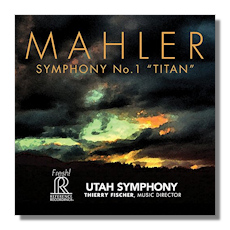
The Internet's Premier Classical Music Source
Related Links
- Mahler Reviews
- Latest Reviews
- More Reviews
-
By Composer
-
Collections
DVD & Blu-ray
Books
Concert Reviews
Articles/Interviews
Software
Audio
Search Amazon
Recommended Links
Site News
 SACD Review
SACD Review
Gustav Mahler

Symphony #1 "Titan"
Utah Symphony Orchestra/Thierry Fischer
Reference Recordings Fresh! SACD FR-715 52:55 Hybrid Multichannel
The Utah Symphony is an important American orchestra, and it is great to see them working with Reference Recordings again. Let's not forget that Maurice Abravanel led this ensemble through the complete symphonies well before the Mahler craze, and even though that set has obvious weak points, it also has many memorable moments. One of the finest Fourths of all is from Utah, and the "Symphony of a Thousand" remains thrilling for the massive sound of the University of Utah Choruses. Times have changed, and the orchestra has gone from iffy sounding Vanguard budget discs to top notch sound on Reference Recordings. Thierry Fischer pays homage to his orchestra's history here, while also attempting to put his own stamp on well-worn music. He's mostly successful.
There's no question that the orchestra as assembled now stands well above its sometimes scrappy Abravanel counterpart. The storied recording team at Reference Recordings captures tons of little details and shows the ensemble in terrific form. Winds are suitably tangy, and we can now appreciate the Utah brass (not a strong point of the original cycle). The horns are especially warm, and the strings are full and rich. In short, we have a brand new ballgame, as they say. Indeed, although these forces lack a "signature sound", it is nice to report just how well they play. That said, I rank them slightly below the other two powerhouses on the Reference roster, Pittsburgh and Kansas City. This is completely subjective, but those two have given us so much "must hear" material. This is not quite that, for a few reasons.
Fischer is a fine young conductor, but he makes some questionable choices. The most noticeable of these is a clipped and not quite rustic Scherzo. At the end of each initial phrasing of the main theme, Fischer makes a very sudden diminuendo that is clearly intended to be a personal touch but comes off as more of a mannerism. He drops this idea later, but it sounds silly. Fine as his orchestra is, they do not possess the sheer character of the Concertgebouw for Bernstein, or the Cologne forces for Gary Bertini. Fischer also finds insufficient contrast in the opening movement, allowing some of the necessary tension to sag here and there. Finally, he sometimes lets his brass players go for broke, and they nearly break. The sound loses its rounded glow, to be replaced by a rather harsh timbre.
However, there is also much to admire. Whatever reservations I have with that Scherzo, the closing bars of it are thrilling. And the third movement strikes me as very well paced, with plenty of color and gorgeous woodwind solos. Fischer also captures the sleaze factor in a way that happily does not draw attention to himself. And the Finale is marvelous, save for the occasional moment when I feel that conductor and orchestra are holding back just slightly. Otherwise, the climaxes are exciting as you could wish, with the final pages an absolute joyride. Everything moves purposefully, with none of the dead spots I found in the opening movement. Keep in mind how subjective reviewing music is; you may find certain things more or less of an issue than I did. But whatever the case, this is truly a "welcome back" party for Utah, and a really fine performance by any standard. Happy 75th birthday, fellas.
Copyright © 2015, Brian Wigman





















